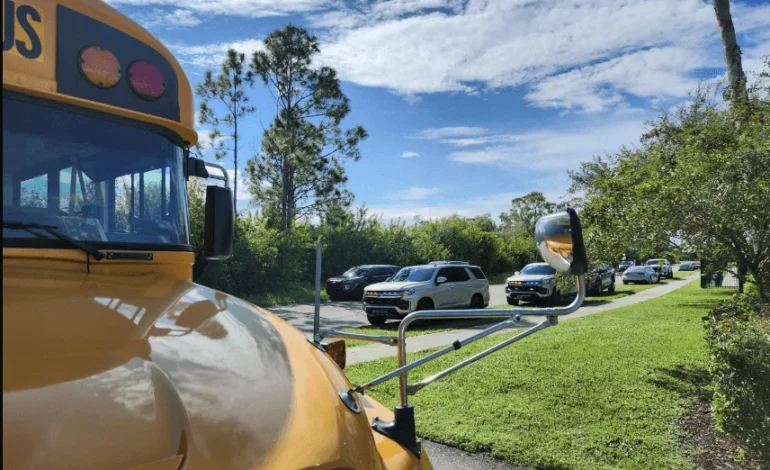
45-year-old Michael Liberta accused of making threats to Troy Elementary School in Vermont. Troy, Vermont – In a concerning development for the local community, Vermont State Police have identified Michael Liberta, a 45-year-old resident of Troy, as the individual responsible for making life-threatening statements directed at staff members of Troy Elementary School
Troy, Vermont – In a concerning development for the local community, Vermont State Police have identified Michael Liberta, a 45-year-old resident of Troy, as the individual responsible for making life-threatening statements directed at staff members of Troy Elementary School. These statements led to two separate lockdowns, an unsettling event for parents, students, and school personnel. The incident has raised significant discussions about safety measures in schools, especially in smaller towns like Troy, where such disruptions are rare but deeply impactful.
The situation unfolded on September 12 when Liberta allegedly called the elementary school, issuing threats severe enough for school officials to immediately take action. Superintendent directives resulted in a lockdown of the facility, with students and staff confined to their classrooms as a precautionary measure. Although Liberta never physically appeared on school property during this incident, the nature of the threats warranted the extreme caution exercised by the administration. Schools across the state and country have been on heightened alert for such incidents, making it necessary for even remote threats to be taken seriously to ensure the safety of the school population.
This, however, was not Liberta’s first interaction with the school under distressing circumstances. A previous lockdown had been enacted just days earlier, on September 4, when Liberta arrived at the school in a visibly agitated state. Reports suggest his frustration stemmed from an issue involving his child, although specific details about that incident have yet to be released. The earlier confrontation seemed to have laid the groundwork for the more severe actions he took later, escalating from an in-person altercation to threats made over the phone. The recurrence of such episodes has left the community anxious, questioning what measures can be further implemented to prevent future disturbances.
In the aftermath of these events, law enforcement swiftly moved to investigate and contain the situation. Liberta now faces a charge of disturbing the peace by electronic communication, which in Vermont is a serious offense, especially when it endangers public institutions like schools. His scheduled court appearance on October 15 is expected to be a focal point for the community as they look for resolution and justice. The case has also drawn attention to broader issues of mental health and crisis intervention, particularly when such incidents involve individuals with children in the school system.
This sequence of events has reignited the debate about school security in rural areas. While urban districts might have more resources for dealing with security concerns, smaller towns like Troy often rely on state police and district protocols that can be slower to respond. The quick thinking and decision-making by Troy Elementary’s administration, however, prevented any physical harm from occurring, showcasing the importance of having solid emergency procedures in place, even in seemingly low-risk environments.
Community members have voiced their concern over the psychological effects such lockdowns can have on young students. The abrupt nature of these lockdowns, often with little warning, can be confusing and frightening for children, particularly those who are too young to fully grasp the seriousness of the threat. Parents have called for increased mental health support in schools, advocating for resources that help children process the fear and uncertainty that follow these disruptions. The anxiety triggered by these events has also extended to parents, many of whom have expressed frustration with the limited information they received during the lockdowns.
The broader impact of these incidents has prompted local authorities to re-examine their communication strategies with the public. Residents of Troy and neighboring communities have called for more transparency when it comes to school threats, particularly regarding how these situations are handled in real-time. While authorities maintain that certain information must be withheld during an active investigation, parents and staff argue that more frequent updates during such crises could ease some of the fear and confusion.
In addition to safety concerns, there is now a growing conversation about the importance of early intervention in cases where individuals may pose a potential risk. Some community members have expressed that more attention should have been given to Liberta’s initial confrontation on September 4, suggesting that if his distress had been addressed adequately then, it might have prevented the subsequent threats. This has led to calls for better training for school personnel in handling escalations before they reach a critical point.
The involvement of the police has brought up questions about the role of law enforcement in school safety. While many are grateful for the quick response by Vermont State Police, there is also a discussion about whether schools need more proactive safety measures, such as on-site security personnel, particularly when dealing with individuals who have shown signs of distress. The situation in Troy could become a case study for other rural districts dealing with limited resources but facing similar threats.
As Liberta’s court date approaches, the community remains on edge, with many hoping that the legal process will bring closure to this unsettling chapter. However, the broader issues it has raised—ranging from mental health to school security—are unlikely to dissipate anytime soon. Parents and school officials are keenly aware that the events in Troy could happen elsewhere, and many are pushing for preventative measures to be a top priority moving forward.
At the same time, discussions about digital communication and its role in threatening behavior have come to the forefront. Liberta’s use of electronic communication to issue life-threatening statements highlights a growing trend where technology enables individuals to commit harmful acts without being physically present. Law enforcement and school districts are now grappling with how to better track and respond to these types of threats, which can often be more difficult to address than traditional in-person confrontations.
As the Troy community looks ahead, many are hopeful that these recent incidents will serve as a catalyst for positive change. Whether through improved mental health resources, enhanced school security measures, or better communication strategies, there is a collective desire to ensure that such threats to school safety are minimized and that the wellbeing of students, staff, and the broader community is safeguarded.



